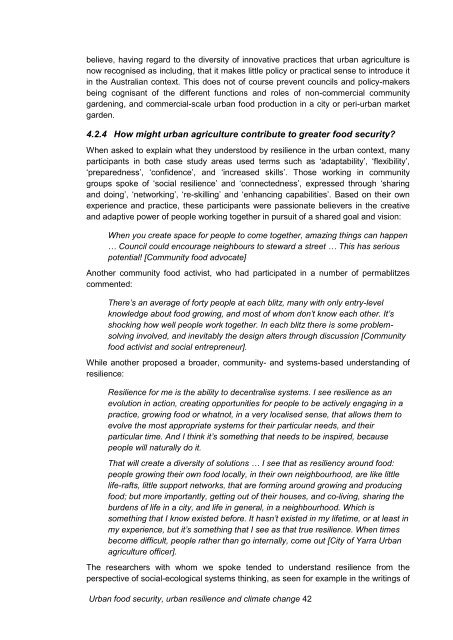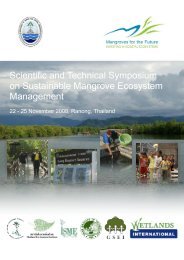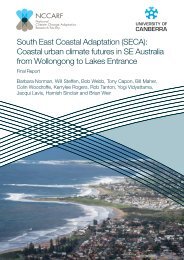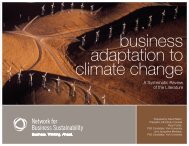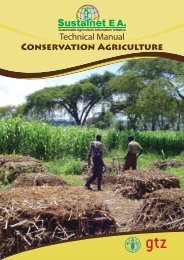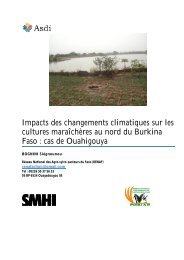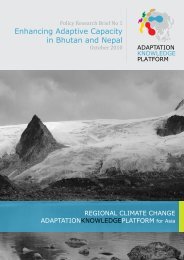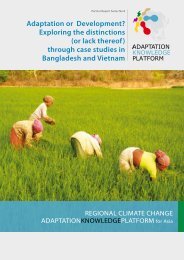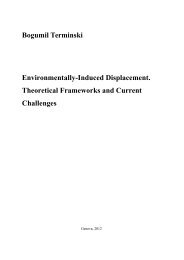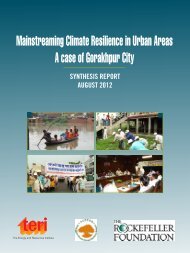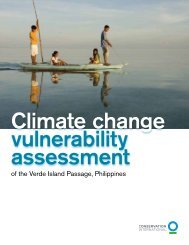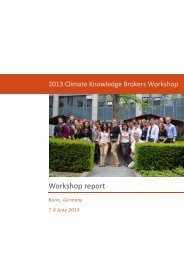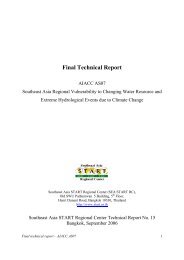This concept of the ‘spaces in between’ is valuable in terms of thinking about thepotential for <strong>urban</strong> agriculture to exp<strong>and</strong> in Australian cities <strong>and</strong> <strong>urban</strong> centres. Thework of Permaculture Gold Coast on a small private site in Ferry Road, Southport, isone example of what can be achieved by creative individuals <strong>and</strong> community groupsworking in partnership with their local councils.One academic researcher pointed out that <strong>urban</strong> agriculture means different things indifferent cultural <strong>and</strong> geographical contexts, with a particular distinction between theglobal North <strong>and</strong> the South, <strong>and</strong> between countries in the former:It means different things in developing countries. In Australia, it’s backyard <strong>and</strong>community gardens, <strong>and</strong> perhaps peri-<strong>urban</strong> market gardens. Here [in the innercity] it’s generally not commercial-scale, as in US spin farming, which can bedone on little blocks of l<strong>and</strong>. In countries like Ghana there are stronger economicdrivers, <strong>and</strong> lighter regulation – for example, they use raw sewage to grow <strong>food</strong>,which obviously creates a transfer of pathogens. Conversely there are benefitswith the higher nutrient content of the water [Academic researcher].Others looked to initiatives <strong>and</strong> approaches in some Southern countries <strong>and</strong> sawvaluable lessons <strong>and</strong> sources of inspiration for what might be possible in Australia:The model we like is Havana [Cuba], <strong>and</strong> we ask ourselves how it could bereplicated here. They achieved a 1000% increase in productivity per unit over an11-year period with key factors including intensive research into bio-fungicides,bio-insecticides <strong>and</strong> integrated pest management, together with the wide diffusion<strong>and</strong> accessibility of that knowledge. The pro-huerta movement in Argentina hasalso achieved impressive results in <strong>urban</strong> <strong>food</strong> production [Academic researcher].Another academic researcher, who had conducted a number of forums with farmers<strong>and</strong> market gardeners on Melbourne’s peri-<strong>urban</strong> zones, commented on theirsomewhat disparaging perceptions of activities typically regarded in Australia as <strong>urban</strong>agriculture, such as community gardening:[Some] farmers think it’s naïve, one comment after a forum was, ‘They think wecan all grow tomatoes in pots on the balcony, <strong>and</strong> that there’ll be enough <strong>food</strong>’.So there’s a perception [amongst farmers] that <strong>urban</strong> agriculture is just smallscale<strong>food</strong> growing in the city, that’s it not commercial, that’s it not going to makeany contribution to <strong>food</strong> supply. I think we should be seeing [<strong>urban</strong> agriculture]more broadly, that we should include what’s on the fringe as well ... agriculturethat takes place on the <strong>urban</strong> boundary. That would include areas of quitesignificant <strong>food</strong> production; <strong>and</strong> the same would apply to the fringe areas ofsatellite cities. [For Melbourne] I’d include Casey-Cardinia, <strong>and</strong> Werribee,Bacchus Marsh, Yarra Valley. If we’re talking about agriculture, it’s more thanpottering around in community gardens. So we have to include peri-<strong>urban</strong>agriculture – where agriculture meets the city, <strong>and</strong> all those issues on the fringeof the city, those tensions [Academic researcher].It was suggested that the terminology of ‘<strong>urban</strong> agriculture’ might not be appropriate todescribe non-commercial activities such as backyard <strong>and</strong> community gardening; <strong>and</strong>whether instead the term ‘<strong>urban</strong> gardening’ might be a better description of suchactivities. Such a distinction has however not been made in the literature; <strong>and</strong> we<strong>Urban</strong> <strong>food</strong> <strong>security</strong>, <strong>urban</strong> <strong>resilience</strong> <strong>and</strong> <strong>climate</strong> <strong>change</strong> 41
elieve, having regard to the diversity of innovative practices that <strong>urban</strong> agriculture isnow recognised as including, that it makes little policy or practical sense to introduce itin the Australian context. This does not of course prevent councils <strong>and</strong> policy-makersbeing cognisant of the different functions <strong>and</strong> roles of non-commercial communitygardening, <strong>and</strong> commercial-scale <strong>urban</strong> <strong>food</strong> production in a city or peri-<strong>urban</strong> marketgarden.4.2.4 How might <strong>urban</strong> agriculture contribute to greater <strong>food</strong> <strong>security</strong>?When asked to explain what they understood by <strong>resilience</strong> in the <strong>urban</strong> context, manyparticipants in both case study areas used terms such as ‘adaptability’, ‘flexibility’,‘preparedness’, ‘confidence’, <strong>and</strong> ‘increased skills’. Those working in communitygroups spoke of ‘social <strong>resilience</strong>’ <strong>and</strong> ‘connectedness’, expressed through ‘sharing<strong>and</strong> doing’, ‘networking’, ‘re-skilling’ <strong>and</strong> ‘enhancing capabilities’. Based on their ownexperience <strong>and</strong> practice, these participants were passionate believers in the creative<strong>and</strong> adaptive power of people working together in pursuit of a shared goal <strong>and</strong> vision:When you create space for people to come together, amazing things can happen… Council could encourage neighbours to steward a street … This has seriouspotential! [Community <strong>food</strong> advocate]Another community <strong>food</strong> activist, who had participated in a number of permablitzescommented:There’s an average of forty people at each blitz, many with only entry-levelknowledge about <strong>food</strong> growing, <strong>and</strong> most of whom don’t know each other. It’sshocking how well people work together. In each blitz there is some problemsolvinginvolved, <strong>and</strong> inevitably the design alters through discussion [Community<strong>food</strong> activist <strong>and</strong> social entrepreneur].While another proposed a broader, community- <strong>and</strong> systems-based underst<strong>and</strong>ing of<strong>resilience</strong>:Resilience for me is the ability to decentralise systems. I see <strong>resilience</strong> as anevolution in action, creating opportunities for people to be actively engaging in apractice, growing <strong>food</strong> or whatnot, in a very localised sense, that allows them toevolve the most appropriate systems for their particular needs, <strong>and</strong> theirparticular time. And I think it’s something that needs to be inspired, becausepeople will naturally do it.That will create a diversity of solutions … I see that as resiliency around <strong>food</strong>:people growing their own <strong>food</strong> locally, in their own neighbourhood, are like littlelife-rafts, little support networks, that are forming around growing <strong>and</strong> producing<strong>food</strong>; but more importantly, getting out of their houses, <strong>and</strong> co-living, sharing theburdens of life in a city, <strong>and</strong> life in general, in a neighbourhood. Which issomething that I know existed before. It hasn’t existed in my lifetime, or at least inmy experience, but it’s something that I see as that true <strong>resilience</strong>. When timesbecome difficult, people rather than go internally, come out [City of Yarra <strong>Urban</strong>agriculture officer].The researchers with whom we spoke tended to underst<strong>and</strong> <strong>resilience</strong> from theperspective of social-ecological systems thinking, as seen for example in the writings of<strong>Urban</strong> <strong>food</strong> <strong>security</strong>, <strong>urban</strong> <strong>resilience</strong> <strong>and</strong> <strong>climate</strong> <strong>change</strong> 42
- Page 1 and 2: Synthesis and Integrative ResearchF
- Page 3 and 4: Published by the National Climate C
- Page 5 and 6: ABSTRACTFood security is increasing
- Page 7 and 8: 1. a review of the literature: on n
- Page 9 and 10: its Food for All project. This help
- Page 13 and 14: In response to the existential thre
- Page 15 and 16: 2. OBJECTIVES OF THE RESEARCHFood i
- Page 17 and 18: debates and to the more systematic
- Page 19 and 20: organisation in the past few years.
- Page 21 and 22: 4. RESULTSIn this section we presen
- Page 23 and 24: increasing productivity. Thus, whil
- Page 25 and 26: people and the origins of their foo
- Page 27 and 28: urban food supply chains. Thus, whi
- Page 29 and 30: This logistics system is dominated
- Page 31 and 32: Like Hodgson et al., as per definit
- Page 33 and 34: esilient, powerful by being locally
- Page 35 and 36: volume or even its contribution to
- Page 37: community food growing can have on
- Page 40 and 41: generations this history has been f
- Page 42 and 43: a stronger focus on addressing the
- Page 44 and 45: The third key aspect is fairness -
- Page 46 and 47: climate (which we live and work in
- Page 48 and 49: agriculture. Eight percent is in ur
- Page 52 and 53: esearch scientist and chair of the
- Page 54 and 55: As discussed above, protection of t
- Page 56: 4.2.5 What is the extent and the im
- Page 60 and 61: no place under the panoply of pract
- Page 62 and 63: increased, the market dominance of
- Page 64 and 65: … the residents of S Park called
- Page 66 and 67: 5. CONCLUSIONSThere is growing conc
- Page 68 and 69: urban resilience. This inevitably c
- Page 70 and 71: In many respects these contrasting
- Page 72 and 73: Many interviewees of both standpoin
- Page 74 and 75: a given area. The rationale for thi
- Page 76 and 77: mapping the location of sources of
- Page 78 and 79: Australian food policy debates refl
- Page 80 and 81: APPENDIX 1: URBAN FOOD SECURITY, UR
- Page 82 and 83: IntroductionGlobally, and in Austra
- Page 84 and 85: Review methodsThis stage of the res
- Page 86 and 87: despite many of the causes of food
- Page 88 and 89: …by 2050… food production will
- Page 90 and 91: 2. How is food security (in general
- Page 92 and 93: the food security of cities, but no
- Page 94 and 95: While some see the density of devel
- Page 96 and 97: when suppliers, distributors, and c
- Page 98 and 99: a more prominent role in enhancing
- Page 100 and 101:
community gardens webpage on the Co
- Page 102 and 103:
comprehensive description of the ca
- Page 104 and 105:
In both the developed and developin
- Page 106 and 107:
Their review notes a significant in
- Page 108 and 109:
lines of supply from often rural pl
- Page 110 and 111:
1 IntroductionCities have always be
- Page 112 and 113:
Despite some attempts to curb urban
- Page 114 and 115:
the Gold Coast remains a city that
- Page 116 and 117:
ackyard/community gardenernot affil
- Page 118 and 119:
level in local government. VicHealt
- Page 120:
Figure 2: Impacts on Municipal Food
- Page 125 and 126:
security I recognise that the cost
- Page 127 and 128:
United States, he offered the follo
- Page 129 and 130:
This vision highlights the multi-fu
- Page 131 and 132:
An environmental education centre.
- Page 133 and 134:
Melbourne Food ForestA Melbourne ga
- Page 135 and 136:
stakeholder consultations, the repo
- Page 137 and 138:
can. We sense the changes. The earl
- Page 139 and 140:
half-desert environments. We’re g
- Page 141 and 142:
etain its basic function and struct
- Page 143 and 144:
government; and that trying to get
- Page 145 and 146:
the north and the west, where it wo
- Page 147 and 148:
Why do people buy so much food that
- Page 149 and 150:
urban agriculture (however broadly
- Page 151 and 152:
enefits and risks. Before we can co
- Page 153 and 154:
Another important and tangible role
- Page 155 and 156:
coast without any problems whatsoev
- Page 157 and 158:
BIBLIOGRAPHYAECOM (2011) Scoping St
- Page 159 and 160:
Burns, C. I., A. (2007). Measuring
- Page 161 and 162:
Edwards, F., & Mercer, D. (2010). M
- Page 163 and 164:
James, S. O’Neill, P. and Dimeski
- Page 165 and 166:
Millar, R., 2012, ‘Government shi
- Page 167 and 168:
Saltmarsh, N. M., J; Longhurst, N.
- Page 169 and 170:
Walker B., 2008, Resilience Thinkin


